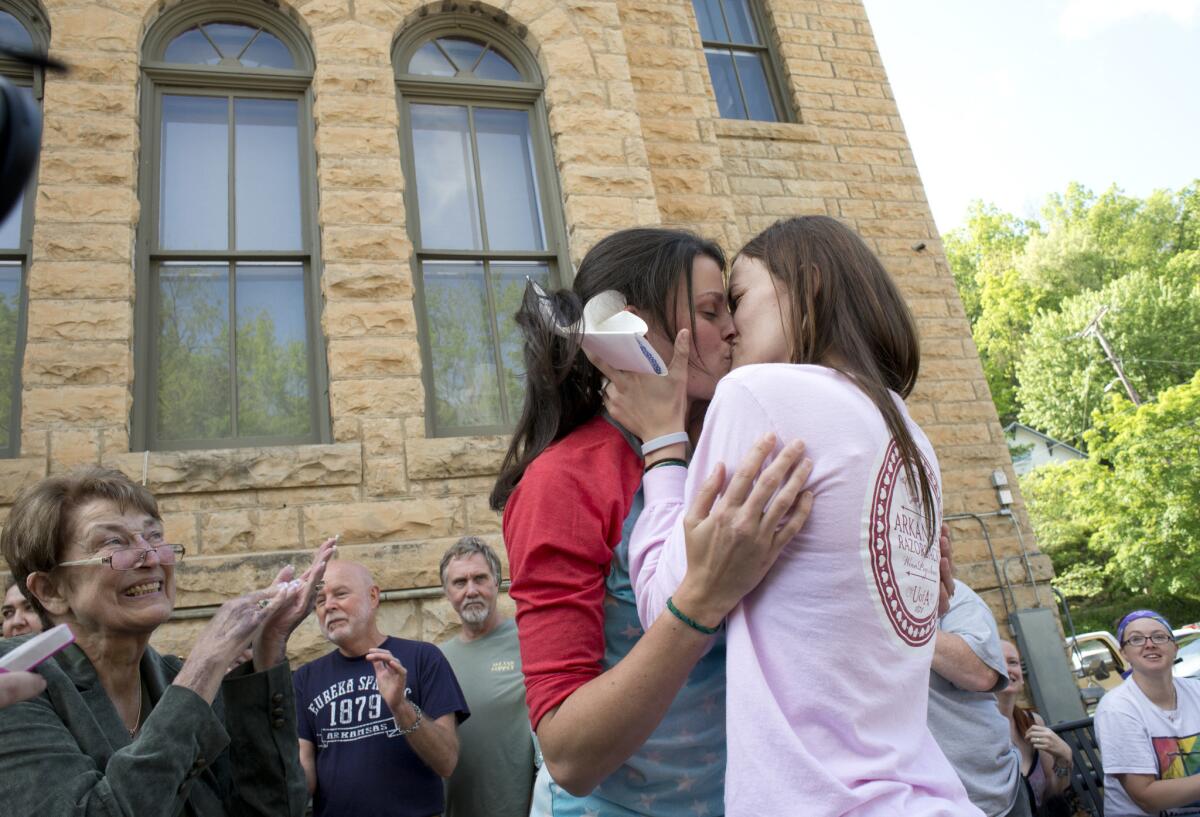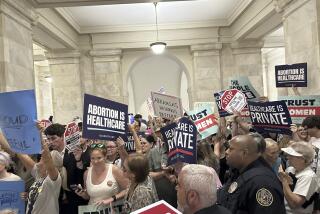Q&A: Gay marriage begins in Arkansas, but for how long?

Several same-sex couples received marriage licenses from a county in Arkansas on Saturday, the morning after a judge held the Southern state’s ban on gay marriage to be unconstitutional.
More than a dozen similar rulings have been handed down across the country since the U.S. Supreme Court ruled last summer that same-sex couples were entitled to some of the same protections as opposite-sex pairs. The bans related to gay marriage, though overturned, have remained in place as the legal appeals continue their way through the courts.
But like judges in Utah and Michigan, the county circuit judge in Arkansas who made the finding of unconstitutionality didn’t immediately stay his decision. That allowed the same-sex marriage licenses to be issued.
What happened Saturday?
Nearly 20 of the more than 70 couples who lined up to receive their licenses in Carroll County succeeded before the sheriff ordered the doors to be closed, said James Rector, president of Northwest Arkansas Center for Equality.
Eureka Springs, an old Victorian-style village set in the picturesque Ozark Mountains, is a go-to spot for weddings in Arkansas. To keep up with the demand, the clerk’s office in Eureka Springs is the only one in the state that opens its doors to handle license applications each Saturday, said Jack Wagoner, one of the plaintiffs’ attorneys handling the Arkansas case.
The office typically closes about 1 p.m., and the sheriff made sure the schedule followed as usual on Saturday, Rector said.
Are those same-sex marriage licenses valid?
Possibly. In Michigan and Utah, where same-sex weddings also occurred until stays halted judges’ rulings, the answer was a stronger “most likely” because the federal lawsuits there clearly applied statewide.
The problem in Arkansas is that the state court lawsuit listed only six counties as defendants, and Carroll County wasn’t one of them. It wasn’t immediately clear to attorneys whether clerks in counties not named in the lawsuit were empowered to ignore the gay marriage ban.
“Clearly, right now, any of the counties that were sued would be on shaky ground if they don’t issue marriage licenses,” Wagoner said Saturday afternoon. “It’s more questionable the applicability of the ruling to state government entities that were not in the lawsuit.”
He said they can argue that the ruling by Pulaski County Circuit Judge Christopher Piazza applies statewide, but that “it’s a gray area.”
What’s expected to happen Monday?
Pulaski County and the other five counties named in the lawsuit are expected to begin issuing marriage licenses to same-sex couples.
“Come Monday morning, there will be lines in Pulaski,” Rector said of the largest county, home to the capital city of Little Rock.
Like Carroll County, the six targeted counties will probably use forms that say “bride” and “groom,” and “Mr.” and “Mrs.”
“When you get an order at 4:51 p.m. on Friday, we aren’t going to be ready by Monday morning with the proper forms,” said Assn. of Arkansas Counties Executive Director Chris Villines. “There’s a lot of reasons you would hope for a stay.”
Villines was joined by more than 100 county officials on a nearly two-hour conference call on Saturday afternoon. The 69 counties not named in the lawsuit are divided over whether to begin issuing same-sex licenses. Some will, some won’t.
“There’s a lot of things we need to take a look at it,” he said, including getting vendors to fix forms and databases. “Not to mention, this is our primary season, so all of our county clerks are working on elections.”
The lawsuit also targeted the state Department of Health (for the right to get birth certificates with two mothers or two fathers) and the Department of Finance and Administration (for the right to file joint tax returns). Those agencies must also comply with the judge’s order unless a stay is issued.
For gay couples, it can’t hurt to try to get married if they are ready to accept the benefits and responsibilities, legal experts said.
Will Judge Piazza issue a stay?
The state has made a case for one.
“A stay is warranted in this case because the U.S. Supreme Court has determined that rulings substantively identical to the court’s ruling in this case should be stayed pending appeal,” Assistant Atty. Gen. Colin Jorgensen said in a Friday night legal filing.
Referring to last summer’s Supreme Court decision, he added, “To date, all of the marriage decisions by trial courts since Windsor have been placed under stay, and remain stayed at this time.”
But gay marriage advocates said the language in Piazza’s ruling suggests he’s not interested in granting one.
If Piazza rejects the state’s request, the state Supreme Court then would have a chance to issue a stay.
What happens if a stay is issued in Arkansas?
The loophole marriages -- the marriages entered into between the ruling and the stay -- are unlikely to be recognized by Arkansas for the purposes of state rights and benefits.
But the U.S. Justice Department has told federal agencies to recognize same-sex marriages as long as they were valid when entered into. Again, this could be a thornier issue in the Saturday marriages since Carroll County isn’t a defendant.
What’s noteworthy about the Arkansas ruling?
Most of the gay marriage court rulings have come out of the federal courts and involved the U.S. Constitution. The Arkansas ruling came out of the state court system, and legal experts said that the judge wasn’t clear in his ruling whether the basis for his findings was the U.S. Constitution, the Arkansas Constitution, or both.
“If it was entirely on state grounds, then the federal courts would not have jurisdiction or the power to overturn it,” said Ruthann Robson, a constitutional law professor at City University of New York. “The ultimate arbiter of state constitution is state courts.”
It’s also unusual for an amendment to a constitution, such as the gay marriage ban, to be held in violation of that same constitution. Though the Iowa Supreme Court made that sort of ruling in 2009, Robson said, usually judges will look to the U.S. Constitution as the authority to strike down a state constitutional amendment.
The confusion over the legal basis for Piazza’s ruling could form part of the state’s argument on appeal to the Arkansas Supreme Court. Robson said the leanings of courts are always in flux, and that it’s tough to predict how the state’s high court would rule.
“Here, the judge really talks about Arkansas having a place to claim in the fight for equality,” Robson said. “That’s something the Iowa Supreme Court said, too. Sometimes, states have an investment in equality that we might not think about.”
Is there anything unique about the Arkansas decision?
One area where Judge Piazza was clear was that he wasn’t afraid of being labeled an activist judge, the type of jurist whom critics deride as making law from the bench and overturning the will of voters.
In his ruling, Piazza criticized the the U.S. Supreme Court’s 1857 decision in Dred Scott v. Sandford. He suggested the court missed a chance to make the nation stronger when it ruled that blacks were not citizens and that the federal government didn’t have the authority to regulate slavery.
“He invokes the most famous failure of the judiciary to protect minority rights, which most people think, if not led to the Civil War, was at least a catalyst for the Civil War,” Robson said.
After the Civil War, the 14th Amendment granted citizenship to former slaves.
Piazza is “saying that it’s up to the courts, and the consequences of not acting is social unrest, or war,” Robson said. “He’s upping the stakes of the judge’s duty to act.”
What’s next for gay rights in Arkansas?
Rector said the gay community was elated that Arkansas was being a leader on a gay rights issue because on so many issues it remains behind.
“There’s still a lot of benefits that need to be covered for the LGBT community,” he said. “We’re still in a state where we are in danger of being fired or losing our homes.”
More to Read
Sign up for Essential California
The most important California stories and recommendations in your inbox every morning.
You may occasionally receive promotional content from the Los Angeles Times.










